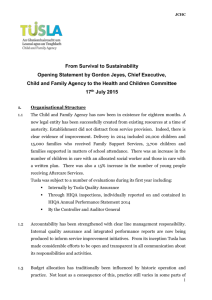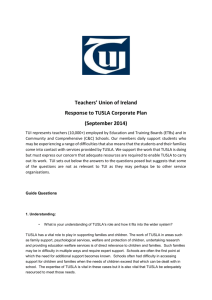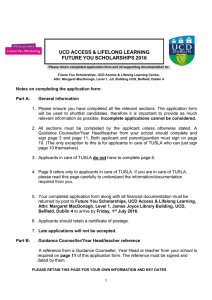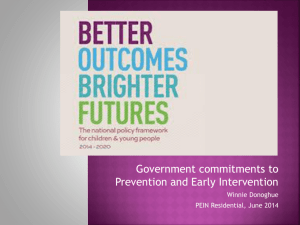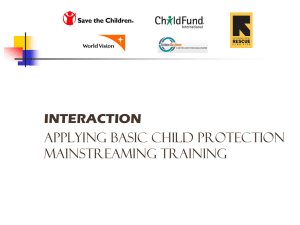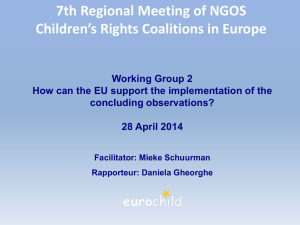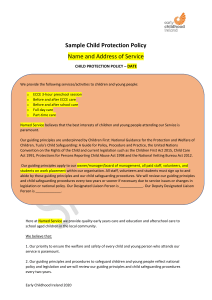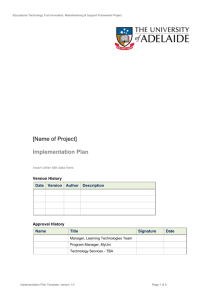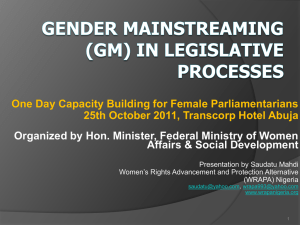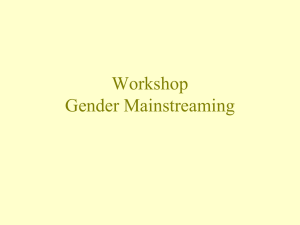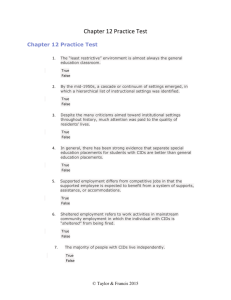Mainstreaming - UNESCO Child and Family Research Centre
advertisement
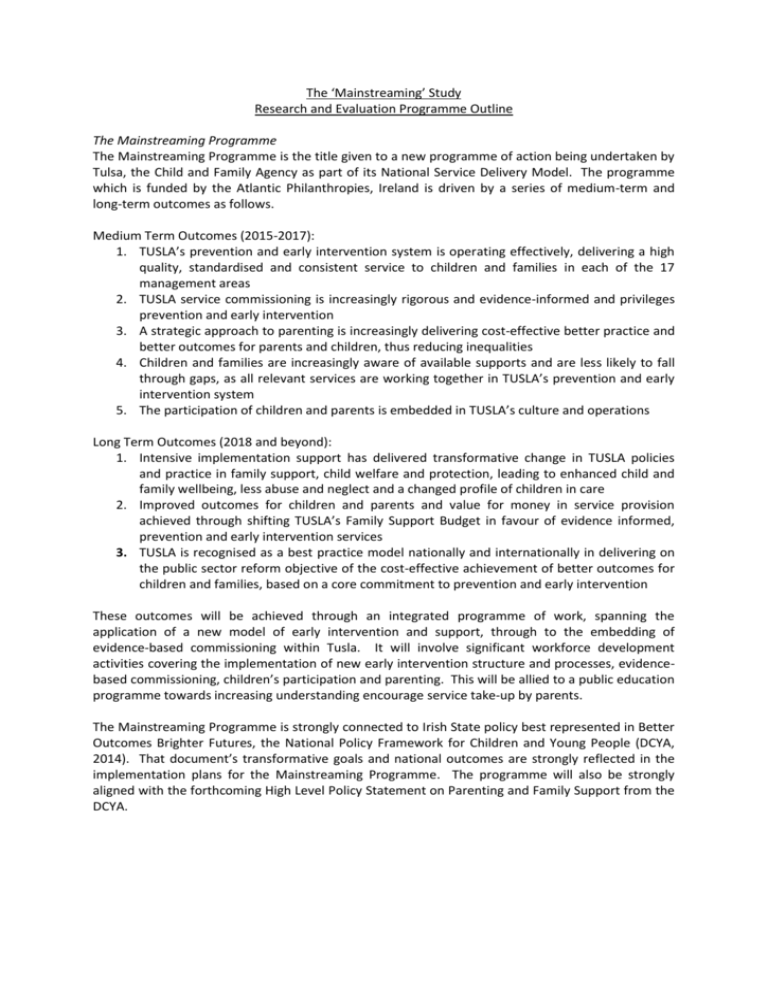
The ‘Mainstreaming’ Study Research and Evaluation Programme Outline The Mainstreaming Programme The Mainstreaming Programme is the title given to a new programme of action being undertaken by Tulsa, the Child and Family Agency as part of its National Service Delivery Model. The programme which is funded by the Atlantic Philanthropies, Ireland is driven by a series of medium-term and long-term outcomes as follows. Medium Term Outcomes (2015-2017): 1. TUSLA’s prevention and early intervention system is operating effectively, delivering a high quality, standardised and consistent service to children and families in each of the 17 management areas 2. TUSLA service commissioning is increasingly rigorous and evidence-informed and privileges prevention and early intervention 3. A strategic approach to parenting is increasingly delivering cost-effective better practice and better outcomes for parents and children, thus reducing inequalities 4. Children and families are increasingly aware of available supports and are less likely to fall through gaps, as all relevant services are working together in TUSLA’s prevention and early intervention system 5. The participation of children and parents is embedded in TUSLA’s culture and operations Long Term Outcomes (2018 and beyond): 1. Intensive implementation support has delivered transformative change in TUSLA policies and practice in family support, child welfare and protection, leading to enhanced child and family wellbeing, less abuse and neglect and a changed profile of children in care 2. Improved outcomes for children and parents and value for money in service provision achieved through shifting TUSLA’s Family Support Budget in favour of evidence informed, prevention and early intervention services 3. TUSLA is recognised as a best practice model nationally and internationally in delivering on the public sector reform objective of the cost-effective achievement of better outcomes for children and families, based on a core commitment to prevention and early intervention These outcomes will be achieved through an integrated programme of work, spanning the application of a new model of early intervention and support, through to the embedding of evidence-based commissioning within Tusla. It will involve significant workforce development activities covering the implementation of new early intervention structure and processes, evidencebased commissioning, children’s participation and parenting. This will be allied to a public education programme towards increasing understanding encourage service take-up by parents. The Mainstreaming Programme is strongly connected to Irish State policy best represented in Better Outcomes Brighter Futures, the National Policy Framework for Children and Young People (DCYA, 2014). That document’s transformative goals and national outcomes are strongly reflected in the implementation plans for the Mainstreaming Programme. The programme will also be strongly aligned with the forthcoming High Level Policy Statement on Parenting and Family Support from the DCYA. Research and Evaluation The UNESCO Child and Family Research Centre at the School of Political Science and Sociology, NUI, Galway will undertake a focused programme of research and evaluation on the implementation and outcomes from the Mainstreaming Programme. Funded by the Atlantic Philanthropies Ireland, the Galway University Foundation and National University of Ireland, the research and evaluation study is built on one overarching question and a set of sub-questions which reflect the planned activities and intended outcomes. Overarching Question The overarching evaluation question to be addressed is whether the organisational culture and practice of Tusla and its partners is changing such that services are more integrated, preventative, evidence informed and inclusive of children and parents. If so, is this contributing to improved outcomes for children and their families? This overall question breaks down further into a set of questions reflecting the medium term outcomes outlined above. Sub-questions 1. Are Child and Family Support Networks established across all 17 management areas with meaningful engagement from a wide spectrum of practitioners and delivering timely integrated support to children, young people and families with additional needs? 2. Have levels of public knowledge about Tusla and its Prevention, Partnership and Family Support increased over the life of the programme? 3. Is service commissioning rigorous and evidence-informed?; does it privilege prevention and early intervention? 4. Is there a strategic approach to parenting in place within Tusla? Is it resulting in costeffective better practice? Is participation by parents embedded in the structures and culture of Tusla? 5. Is participation by children embedded in the structures and culture of Tusla? More specific questions have been developed based on detailed plans for the Mainstreaming Programmme developed by Tusla. While the evaluation will be strongly outcome-focused and ‘summative’ in nature, with final evaluation outputs containing statements of judgement on programme value, it will also have a strong ongoing focus on implementation and will be ‘formative’, in that learning from the evaluation will be fed into the programme on an ongoing basis. Self-evaluation processes will be established alongside the external evaluation. A work-package approach will be adopted involving research and evaluation sub-studies on the main areas of activity within the Mainstreaming Programme. The research and evaluation programme is avowedly mixed methods in orientation, with a range of research and evaluation methods and approaches to be adopted and attendant data analysis strategies. There are some aspects of the programme for which detailed plans are not yet ready, and / or which will evolve as programme implementation becomes more extensive. Plans for research and evaluation will develop alongside these more evolutionary aspects.
